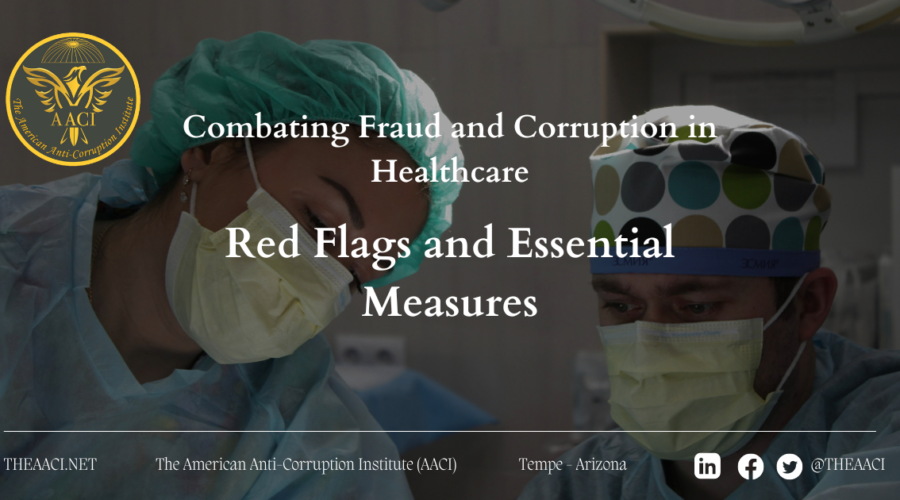Technical Staff
July 29, 2024
Fraud and corruption in the healthcare industry not only drain valuable resources but also undermine the trust and safety of patients. Recognizing the unique red flags and implementing robust anti-corruption measures are crucial steps in safeguarding the integrity of healthcare systems. Here, we explore the most significant red flags of fraud and corruption in healthcare and suggest effective measures to deter, prevent, and detect such activities.
Significant Fraud and Corruption Red Flags in Healthcare
1. Excessive Billing:
One of the most common indicators of fraud is repeated and unexplained high billing amounts compared to similar providers. This can signal overcharging or billing for services not rendered.
2. Unnecessary Medical Procedures:
Performing or prescribing unnecessary medical tests or procedures to increase billing can not only defraud the system but also endanger patient health.
3. Ghost Patients:
Billing for services provided to non-existent patients is a clear sign of fraudulent activity. This often involves fabricated patient records and services.
4. Upcoding:
Billing for more expensive services or procedures than were actually provided inflates costs and is a deceptive practice aimed at maximizing reimbursements.
5. Kickbacks:
Receiving or offering improper payments or benefits to influence healthcare decisions, such as referrals, can corrupt medical judgment and inflate costs.
6. Duplicate Claims:
Submitting multiple claims for the same service or procedure is a tactic used to extract more funds than is entitled.
7. False Diagnoses:
Providing incorrect diagnoses to justify unnecessary treatments or higher billing is not only fraudulent but also unethical, as it can lead to patient harm.
8. Improper Financial Relationships:
Financial ties between healthcare providers and suppliers or other entities that could influence patient care decisions without disclosure are a major red flag.
9. Phantom Inventory:
Reporting or claiming inventory that does not exist can indicate fraudulent procurement and inventory management practices.
10. Manipulation of Clinical Trials:
Falsifying data or outcomes in clinical research to favor certain products or treatments undermines scientific integrity and patient trust.
Essential Anti-Corruption Measures in Healthcare
1. Robust Internal Controls:
Establish comprehensive internal control mechanisms to detect and prevent fraud. Regular checks and balances help ensure that all processes comply with legal and ethical standards. Effective internal control is a principle of fighting corruption.
2. Regular Audits and Monitoring:
Conduct frequent and thorough audits of billing and financial practices to identify discrepancies and anomalies early on.
3. Whistleblower Protection Programs:
Implement and enforce policies that protect whistleblowers from retaliation. Encouraging staff to report suspicious activities without fear is crucial. Rewarding corruption fighters is a principle of fighting corruption.
4. Conflict of Interest Policies:
Enforce strict policies to identify and manage conflicts of interest, ensuring that healthcare decisions are made in the best interest of patients.
5. Training and Education:
Provide ongoing training to staff on anti-fraud measures and ethical practices. Knowledgeable employees are better equipped to recognize and prevent fraud. Investing in corruption prevention is a principle of fighting corruption.
6. Use of Technology:
Implement advanced data analytics and AI to detect unusual patterns and anomalies in billing. Technology can greatly enhance the ability to identify fraudulent activities.
7. Clear Reporting Mechanisms:
Establish straightforward channels for reporting suspected fraud or corruption. Easy reporting procedures encourage vigilance and accountability.
8. Vendor Management:
Scrutinize and monitor relationships with third-party vendors and suppliers to prevent collusion and ensure compliance with ethical standards.
9. Legal Compliance Programs:
Ensure compliance with relevant laws and regulations, such as the False Claims Act and Anti-Kickback Statute. Legal adherence is foundational to preventing fraud.
10. Ethical Leadership:
Promote a culture of integrity and ethical behavior from the top levels of the organization. Leadership commitment to ethical practices sets the tone for the entire organization.
By recognizing these red flags and implementing robust anti-corruption measures, healthcare organizations can protect themselves from fraud and corruption, ensuring that resources are used efficiently and patient trust is maintained.
Photo by Павел Сорокин: https://www.pexels.com/photo/surgeons-performing-surgery-2324837/











































